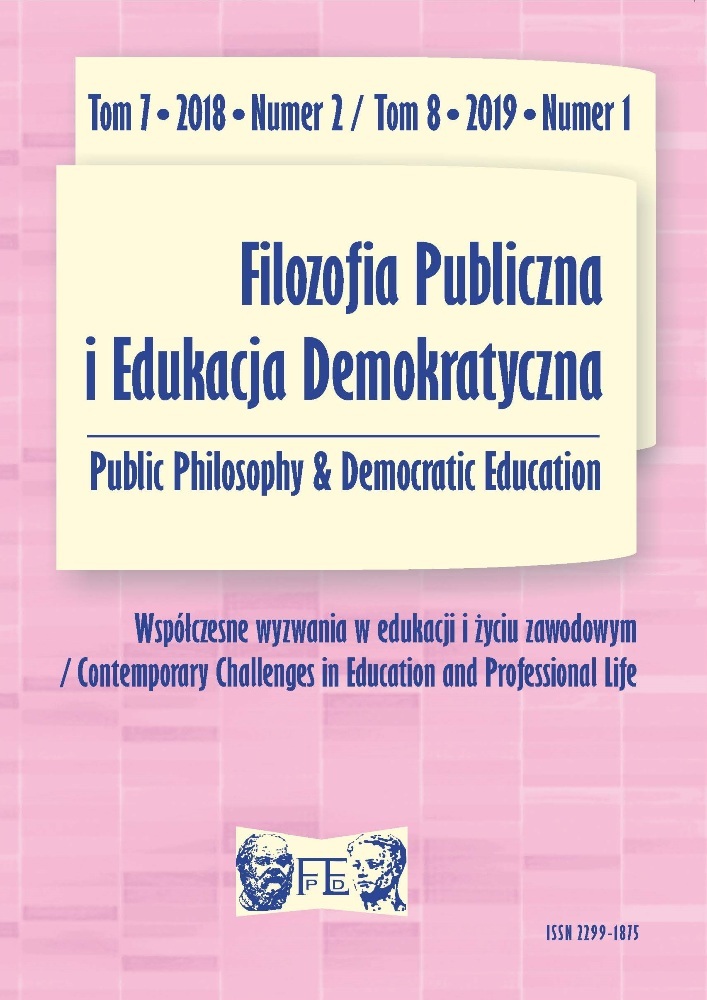Abstract
Lies occupy a surprisingly favorable place within our daily life. As the Polish aphorist Stanisław Jerzy Lec once remarked: if you want to see the lie you need to face the obvious truth. With lies, we do not simply stigmatize the dark part or the „backside” of the humankind. To lie, meaning the ability to deceive, with or without words, even to deceive with the truth (for example in statistics), is one of the intellectual modalities of human existence, as well as an expression of misery. This leads to the paradox: One cannot live with lies or, at the same time, live without them. Lies thus reveal their double nature; they attempt to maintain vivid things, just as they generally tend to destroy them. This double nature of lies makes it impossible to condemn them by means of „ethical conviction”, as Max Weber would put it, or with the words of another famous French philosopher of our present time, Vladimir Jankélévitch, who says that consciousness is already provided with an inner disposition to lie, as a litmus test of its noble and mean sides.
References
Aurelius Augustinus, Die Lüge & Gegen die Lüge, Augustinus Verlag, Würzburg 1986.
Aurelius Augustinus, Über die wahre Religion, Reclam, Stuttgart 1991.
Bettetini M., Breve storia della bugia, R. Cortina, Milano 2001.
Blumenberg H., Die nackte Wahrheit, Suhrkamp/Insel, Berlin 2019.
Blumenberg H., Paradygmaty dla metaforologii, tłum. B. Baran, Aletheia, Warszawa 2017.
Chamberlain H.S. (Hrsg.), Briefwechsel zwischen Schiller und Goethe, Diederichs, Jena 1910.
Chudy W., Społeczeństwo zakłamane, Bd. 1, und Bd. 2: Kłamstwo jako metoda, Oficyna Naukowa, Terminus, Warszawa 2007.
Dietzsch S., Krótka historia kłamstwa. Przekorne eseje filozoficzne, Muza, Warszawa 2000.
Goethe J.W., Ifigenia na Taurydzie, tłum. P. Parylak, wyd. 2 przejrzane i poprawione, Z Drukarni A. Barona, Cieszyn 1900.
Gracián B., Handorakel und Kunst der Welt-Klugheit, C. Marro-quin (Hrsg.), Dieterich’sche Verlagsbuchhandlung, Leipzig 1982.
Hamanns J.G., Briefwechsel, Bd. 1, W. Ziesemer (Hrsg.), Insel, Leipzig 1940.
Hebbel F., Tagebücher, Bd. 2 [Eintrag vom 13. Sept. 1840], Stehr’s Verlag, Berlin 1905.
Hose M., „Fiktionalität und Lüge”, Poetica 1996, Bd. 28.
Jankélévitch V., „Du mensonge” [1942], in: idem, Philosophie morale, Flammarion, Paris 1998.
Jankélévitch V., Von der Lüge, S. Dietzsch (Hrsg.), Felix Meiner, Hamburg 2016.
Jędrzejko P., Płynność i egzystencja, BANANAART.PL/EXMACHINA/M-STUDIO, Sosnowiec 2008.
Jüngel E., Das Evangelium von der Rechtfertigung des Gottlosen als Zentrum des christlichen Glaubens, Mohr Siebeck, Tübingen 1998.
Kant I., Rozprawy z filozofii historii, tłum. i oprac. Translatorium Filozofii Niemieckiej Instytutu Filozofii UMK pod kierunkiem M. Żelaznego, Wstępem poprzedził T. Kupś, Wydawnictwo Antyk, Kęty 2005.
Kant I., Über ein vermeintes Recht aus Menschenliebe zu lügen. Akademie-Ausgabe, Bd. 8, Georg Reimer Verlag, Berlin 1912.
Kant I., Uzasadnienie metafizyki moralności, tłum. R. Ingarden, PWN, Warszawa 1984.
Kant I., Zapowiedźbliskiego zawarcia traktatu o wiecznym pokoju w filozofii, w: idem, Dzieła zebrane, t. 4: Pisma po roku 1781, Wydawnictwo UMK, Toruń 2012.
Lec S.J., Alle unfrisierten Gedanken, K. Dedecius (Hrsg.), Hanser, München 1991.
Lec S.J., Myśli nieuczesane, Noir sur Blanc 1957.
Liessmann K.P. (Hrsg.), Der Wille zum Schein. Über Wahrheit und Lüge, Paul Zsolnay Verlag, Wien 2005.
Meinong A., Über Annahmen, Ambrosius Barth, Leipzig 1910.
Nestroy J.N., Kampl oder das Mädchen mit Millionen und die Näherin (1852), Bergland-Verlag, Wien 1978.
Nietzsche F., Gedichte, Insel, Leipzig 1923.
Nietzsche F., Nachgelassene Fragmente 1869–1874, KSA 7, Walter de Gruyter, München–Berlin–New York 1980.
Nietzsche F., O prawdzie i kłamstwie w pozamoralnym sensie, w: idem, Pisma pozostałe 1862–1875, tłum. B. Baran, Wydawnictwo Aletheia, Kraków 1998.
Pascal B., Myśli, tłum. T. Żeleński-Boy, BKF, Wydawnictwo Naukowe PWN, Warszawa 2008.
Pessoa F., Das Buch der Unruhe, G.R. Lind (Hrsg.), Ammann Verlag, Zürich 1997.
Platon, Hippiasz mniejszy, tłum. W. Witwicki, PWN, Warszawa 1958.
Platon, Teajtet, tłum. W. Witwicki, PWN, Warszawa 1958.
Ricoeur P., Wahrheit und Geschichte, Licht Verlag, München 1974.
Roth F. (Hrsg.), Hamann’s Schriften, Bd. 3, Reimer Verlag, Berlin 1822.
Scheler M., Vom Umsturz der Werte, Francke, Bern 1955.
Schubert F.W., „Immanuel Kant und seine Stellung zur Politik in der letzten Hälfte des achtzehnten Jahrhunderts”, Historisches Taschenbuch 1838, R. 9.
Sofokles, Filoktet. Tragedie, t. 2, Cykl trojański, tłum. i oprac. A. Libera, PIW, Warszawa 1975.
Voltaire, Oevres compl., Nouvelle Èdition, Bd. 34, Furne, Jouvet et Cie., Paris 1880.
Weinrich H., Linguistik der Lüge, Verlag Lambert Schneider, Heidelberg 1966.
Wittgenstein L., Vorlesungen über die Philosophie der Psychologie 1946/47, Suhrkamp, Frankfurt am Main 1991.
License
Copyright (c) Authors retain copyright and publishing rights to their articles in this journal, granting the journal the right to distribute them under the terms of the CC BY-NC-ND 4.0

